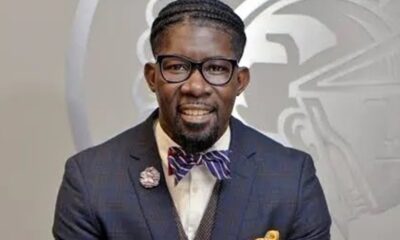Bahamas News
Prime Minister Davis calls for a stronger, more resilient and prosperous region as CARICOM 44th Meeting convenes
Published
3 years agoon
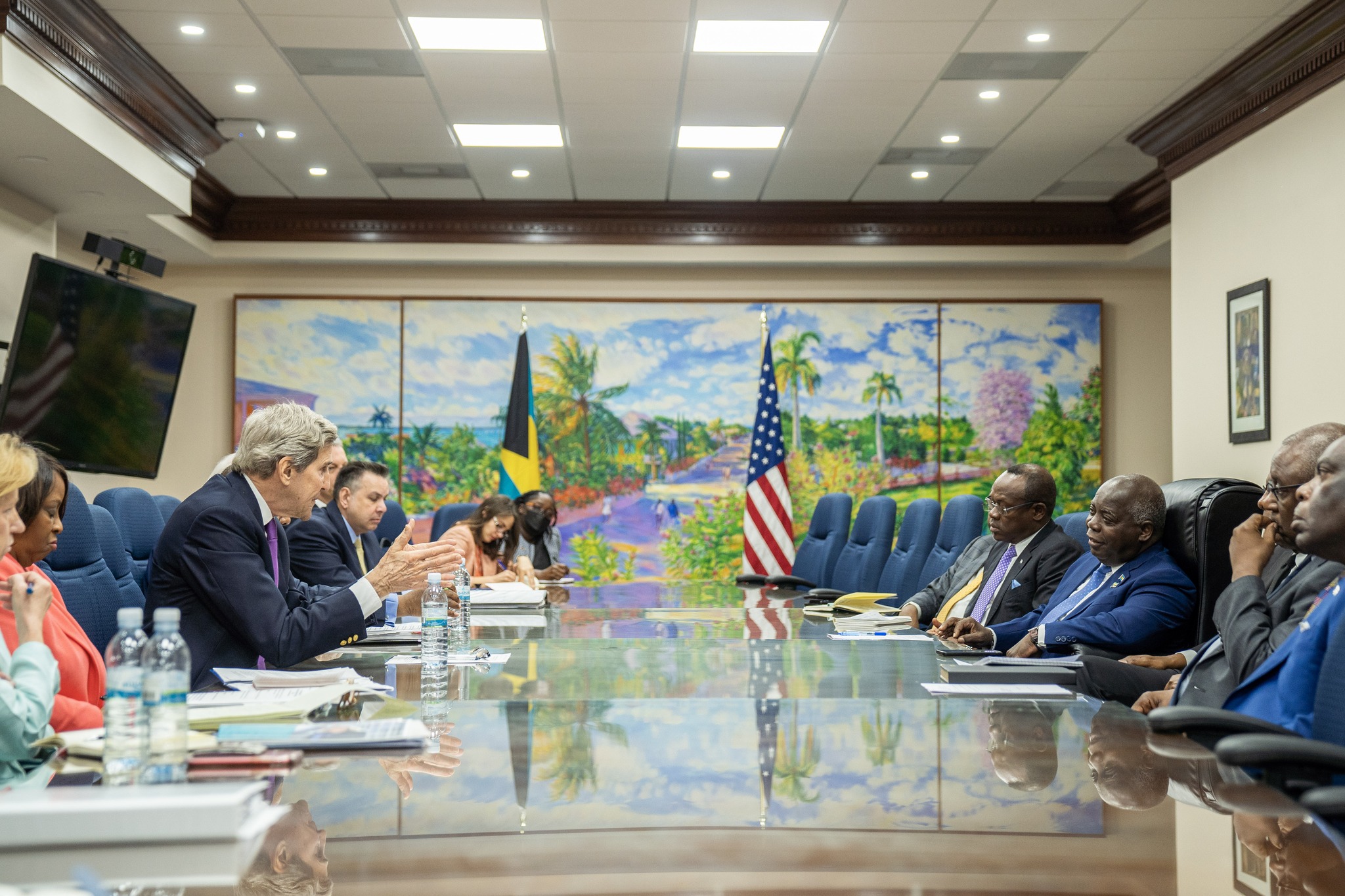
NASSAU, The Bahamas – As the Caribbean Community and Common Market (CARICOM) community observes its golden jubilee, the Hon. Philip Davis, Prime Minister and Minister of Finance and Chair of CARICOM, called for leaders attending the 44th Regular Meeting of the Conference of Heads of Government of CARICOM to unite to build a stronger, more resilient and prosperous region.
“In celebrating the institutions and achievements of these five decades, the many peoples of our region should look back and rightly feel a sense of pride in all that has been gained, and the value added to the region. But it also presents an occasion to look forward, to seize the opportunity to collaborate, to co-operate, and, through our collective effort, build a stronger, more resilient, and more prosperous region,” said Prime Minister Davis.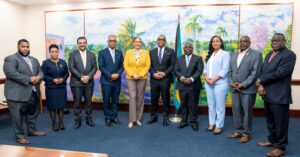
The Heads of Government meeting officially opened Wednesday, February 15, 2023 in the Grand Ballroom, Atlantis Resort, Paradise Island. The two-hour ceremony showcased the culture of The Bahamas and featured performances by national institutions and local entertainers.
The three-day meeting (Feb. 15-17) brings together heads of government, honoured and distinguished guests from within and beyond the Caribbean region. Among them, Justin Trudeau, Prime Minister of Canada; Dr. Carla Natalie Barnett, Secretary General, CARICOM; a U.S. delegation led by Brian Nichols, U.S. Assistant Secretary for Western Hemisphere Affairs; and John Kerry, U.S. Special Presidential Envoy for Climate; and heads of international financial and trade organizations.
Also present were: Her Excellency Leslia Miller-Brice, Bahamas High Commissioner to CARICOM; Cabinet ministers, parliamentarians, senators, representatives of the judiciary, the diplomatic corps, senior government officials and former Prime Ministers Perry Christie, Hubert Ingraham, and Dr. Hubert Minnis.
The CARICOM 50th anniversary theme is ’50 Years Strong: A Solid Foundation to Build On.’
Prime Minister Davis noted the joint celebration of the 50th anniversary of The Bahamas’ Independence, and the 50th anniversary of the founding of CARICOM. He said, “And as it is in The Bahamas, so it is that our region also faces a host of opportunities, and an array of challenges. We should take great comfort from the fact that our forebears came together fifty years ago, exactly for this purpose: to take full advantage of the opportunities of our time, and to implement solutions to the challenges that confront us.”
He underscored key highlights of the meeting, which is expected to offer in-depth discussions on recurring and new issues of climate change, reform of the global financial architecture, the crisis in Haiti, food security, human trafficking, guns and drugs smuggling among others.
Said Prime Minister Davis, “The turmoil and suffering there continue to worsen. As a near neighbour, The Bahamas is under great strain, and many other countries in our region are also heavily impacted. We will all benefit if Haiti is again a fully-functioning state. We should learn from the failures of past efforts to help, rather than use those disappointments as an excuse for inaction. I pray that we can agree a series of concrete steps to help move towards a solution for the Haitian people, and the region as a whole.
“We have learned that inaction has its own costs and consequences.”
On climate change he said, “Nowhere is that more the case than on the issue of climate change, which threatens to upend lives around the world, and presents an existential threat to so many of us in this region. Yet, even though we in the CARICOM region are especially vulnerable to the rising sea levels and temperatures, erosion of our coastal communities, and hurricanes which are more frequent and more intense — by working together, we show that we are not powerless. I have no doubt that in joining our voices last year to present an agreed position at COP27, we helped to influence the shift in position relating to ‘Loss and Damage’ arising from the impact of climate change.”
Moreover, Prime Minister Davis said issues of investment and co-operation in education, infrastructure, food and energy security, will help to support collective national development.
“For all the loss and havoc wrought by the COVID-19 pandemic, it did teach us valuable lessons about what’s important, and about what we need to do to save lives and livelihoods. For example, here in The Bahamas, we have in the past talked about the need to ensure food security. But since the advent of the pandemic, we recognized that the need to be able to feed ourselves was not just an economic nicety, but a matter of survival.”
important, and about what we need to do to save lives and livelihoods. For example, here in The Bahamas, we have in the past talked about the need to ensure food security. But since the advent of the pandemic, we recognized that the need to be able to feed ourselves was not just an economic nicety, but a matter of survival.”
On other “priority” issues he urged the leaders to seek to strengthen their collective response to end the smuggling of guns and drugs and do all they can to wipe out the misery of human trafficking.
“Whether the issues are old or new, in order to make lasting progress, we must address and promote our narrow national self-interests firmly within the framework of the interests of us all. None of us will be safe until we are all safe.
“None of us will develop sustainably or securely, if we leave our neighbours behind. None of us will truly prosper if our resources are forever taxed by the poverty and instability of those nearby.
“Going it alone will not work. This is not to say that while we continue to strengthen and build our region, we should dilute or abandon the founding principle of our nation states, namely the right to self-determination.
“As neighbours, we should continue to embrace each other, and know that we will all succeed if we hold fast the threads that bind us together,” said Prime Minister Davis.
During the opening ceremony Prime Minister Davis also conferred the 13th CARICOM Triennial Award for Women on the Rt. Hon. Dame Janet Bostwick, who has championed the cause for the empowerment and improvement of the status of women and girls in The Bahamas and the region.
The Caribbean Community was established on 4 July 1973 with the signing of the Treaty of Chaguaramas. Member states are: Antigua and Barbuda, Bahamas, Barbados, Belize, Dominica, Grenada, Guyana, Haiti, Jamaica, Montserrat, Saint Kitts and Nevis, Saint Lucia, Saint Vincent and the Grenadines, Suriname, and Trinidad and Tobago. Associate members are: Anguilla, Bermuda, British Virgin Islands, Cayman Islands and Turks and Caicos Islands.
(BIS Photos/Patrick Hanna)
You may like
-


Passport Data to Power New Voter ID System, Says PM Davis
-


Bahamas Signs Major Agreements at Brazil–Caribbean Summit to Boost Food Security, Climate Resilience, and Regional Development
-


The Government Signs Power Purchase Agreements to Help Transform Power Generation Across the Family Islands
-


Bahamas Secures First Budget Surplus Since Independence: PM Davis Touts Milestone for PLP Government
-


PM Davis: New Solar Power PPA is ‘a bold step forward’
-


National Museum’s ‘Open the Gates’ ceremony – “a new epoch in our national story,” said the Prime Minister
Bahamas News
Next U.S. Ambassador? Walker Pledges Business-Driven Approach as U.S. Looks to Counter China in The Bahamas
Published
3 weeks agoon
September 16, 2025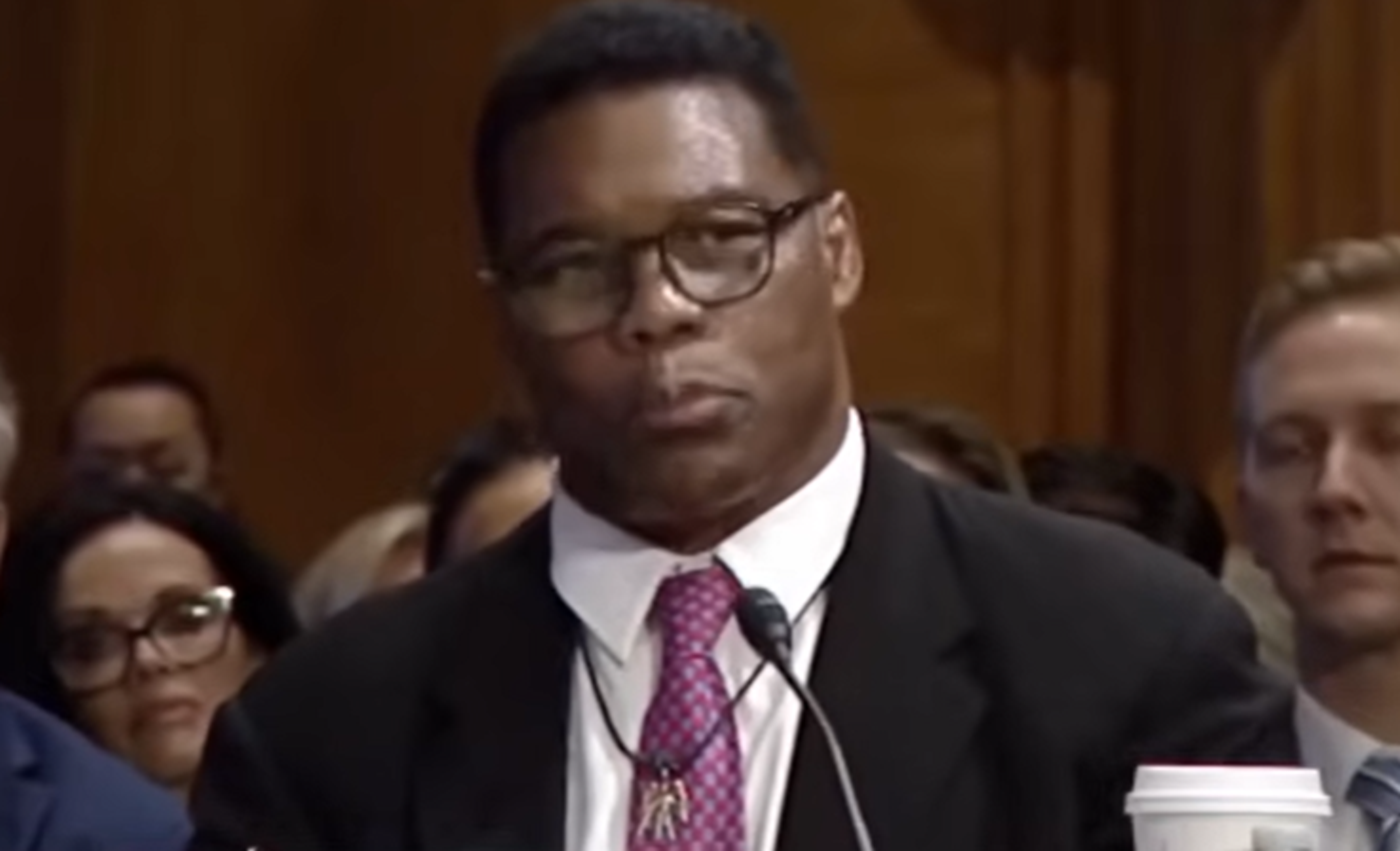
Deandrea Hamilton | Editor
The Bahamas, September 16, 2025 – For the first time since 2011, the United States is on the cusp of sending an ambassador to The Bahamas — and the nominee, former football star turned entrepreneur Herschel Walker, is promising to bring his business instincts to the diplomatic table.
Speaking before the Senate Foreign Relations Committee last week, Walker underscored that his background in food-service companies and small business leadership has prepared him to think practically about investment. “I know how to run a business, how to create jobs, how to make payroll. Those lessons translate into building relationships and building trust,” Walker said.
Walker, who was nominated by President Trump in December 2024, faced the Senate Foreign Relations Committee on September 11. As of now, he has not yet been confirmed; his nomination remains under review, pending a committee vote before it can move to the full Senate. If approved, he would become the first U.S. ambassador to The Bahamas since 2011.
For years, U.S. officials have stressed security and counternarcotics cooperation with The Bahamas, including through “Operation Bahamas, Turks and Caicos.” But in areas like infrastructure, medical care, and long-term investment, Washington has often been absent.
Hospitals and clinics remain under-resourced, and hurricane recovery has been slow in many islands. Chinese state-backed firms, by contrast, have shown up with financing packages and construction deals — a presence that has raised alarms on Capitol Hill.
“Only 50 miles off our shore, The Bahamas is too important for us to ignore,” warned Senate Foreign Relations Committee leaders during Walker’s hearing. They called China’s inroads “strategic, not charitable,” suggesting Beijing’s long game is about ports, proximity, and political leverage.
Walker positioned himself as a nontraditional but pragmatic envoy. He argued that his business career, rooted in private sector success, equips him to champion American investment in The Bahamas.
He pledged to:
- Promote U.S. companies interested in medical and infrastructure projects.
- Support an environment that encourages American investors to see The Bahamas as more than just a beach destination.
- Highlight opportunities for partnerships that improve public services, healthcare, and resilience against hurricanes.
“I’ve built businesses. I know what it takes to attract investors and create opportunity. That is exactly what I intend to bring to our relationship with The Bahamas,” Walker said.
The Bahamas is not just a tourist paradise. It’s a frontline state in migration, drug interdiction, and hurricane response. More than six million U.S. visitors travel there annually, making stability and safety a U.S. domestic concern as much as a foreign policy one.
million U.S. visitors travel there annually, making stability and safety a U.S. domestic concern as much as a foreign policy one.
And yet, with the ambassador post vacant for 14 years, the U.S. has often looked detached — opening space for China’s ambitious Belt and Road agenda. The fear is that infrastructure deals signed today could give Beijing leverage in the region tomorrow. Walker’s confirmation would symbolize a course correction, signaling Washington’s intent to re-engage not only in security but in the economic future of The Bahamas. Not everyone is convinced Herschel Walker is the right man for the job. His nomination revived controversies from his 2022 Senate run, including past allegations, public gaffes, and doubts about whether he has the diplomatic polish the post demands. Some senators and analysts questioned whether celebrity and business experience were enough for a role requiring nuance in foreign policy and geopolitics.
Critics argued that The Bahamas, sitting just 50 miles from Florida and facing intense Chinese interest, deserves a seasoned diplomat rather than a political ally.
Walker confronted those doubts head-on. “People have underestimated me all my life — in academics, athletics, and business,” he told the Senate Foreign Relations Committee. “And I have always proven them wrong, through discipline, determination, and by outworking everyone.”
He admitted he had never served as an ambassador but countered that his career prepared him in other ways: building businesses, managing payrolls, and connecting with people from all walks of life. He framed his business background as a strength, promising to use it to encourage U.S. investment in healthcare, infrastructure, and hurricane resilience projects in The Bahamas.
Rather than sparring with critics, Walker leaned on confidence and persistence: “I know how to build trust and find common ground. That’s what this relationship needs.”
If confirmed, Walker would have to balance his role as diplomat with expectations of being a commercial cheerleader for U.S. firms. His emphasis on entrepreneurship suggests a willingness to push U.S. businesses toward opportunities in healthcare, ports, and post-storm reconstruction — areas where Bahamians say they need the most support.
For Bahamian officials, the question will be whether Washington is prepared to back words with financing. U.S. private sector dollars, paired with aid and development partnerships, could help shift the tide against Chinese influence.
For Walker, the test will be whether his business acumen can translate into diplomatic wins — giving Bahamians alternatives to Beijing, while deepening the U.S. role in the Caribbean.
Analysis: If Walker delivers, this appointment could mark a turning point: a U.S. strategy that recognizes that in the Caribbean, investment is diplomacy.
Bahamas News
Conflicting Reports as Grand Bahama Awaits Its New Airport: What to Believe?
Published
3 weeks agoon
September 16, 2025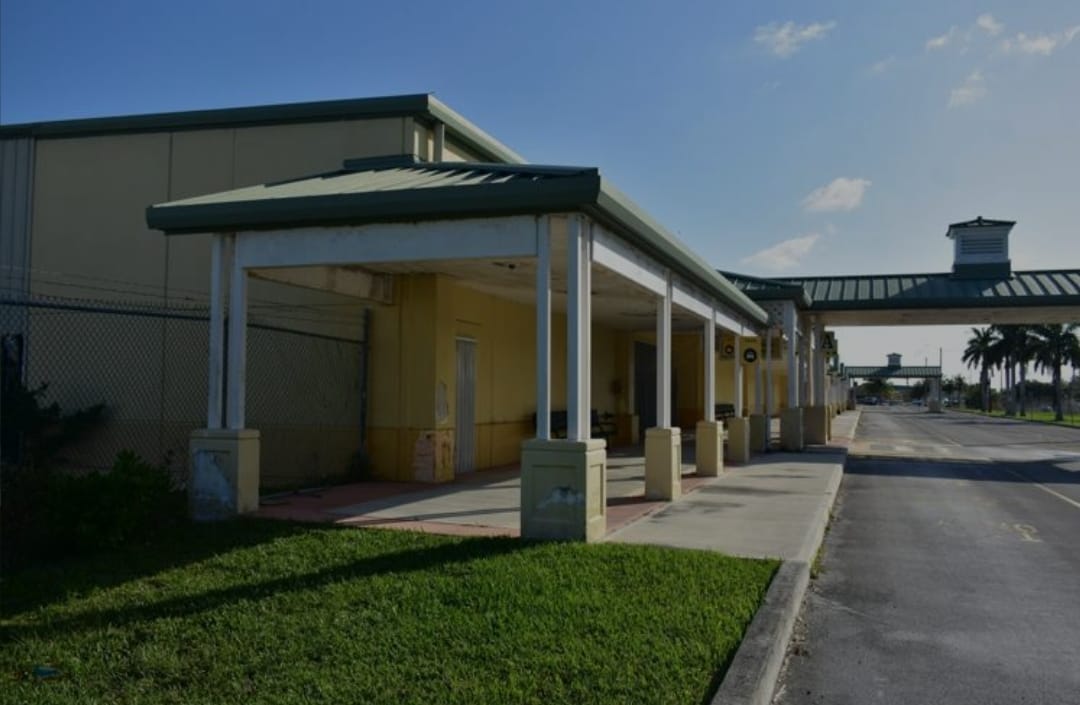
Deandrea Hamilton | Editor
September 16, 2025 – Grand Bahama’s wait for a modern international airport has taken another dramatic turn. Just days after reports surfaced that the $200 million redevelopment had collapsed because partners failed to secure financing, the government is now insisting the project is alive and well — with funding in the “final stages” and construction on the horizon.
Earlier This Week: Airport Deal in Dire Straits
The week began with grim headlines. Deputy Prime Minister and Aviation Minister Chester Cooper confirmed that private partners in the much-heralded consortium had not produced financing. “Regrettably, the funding had not happened,” he admitted, sparking widespread fears the deal had crumbled.
Those admissions triggered a storm of skepticism in Freeport. Back in February, the government had declared the airport deal “finalized,” naming Aerodrome Ltd., Manchester Airport Group, and BHM UK as partners. They promised demolition within 30 days, designs in 45 days, and a new terminal by year’s end. But now, more than four months later, not a single milestone has been delivered.
For residents and business leaders, the collapse narrative confirmed their worst fears: that Grand Bahama was once again being strung along with empty promises. Long-stay tourism — the kind that sustains hotels, restaurants, taxis, and shops — depends on a functioning airport. Without it, the island’s economy remains hobbled.
Today: Government Pushes Back
But late Thursday, the government issued a forceful rebuttal. “The redevelopment of Grand Bahama’s International Airport remains a central priority for this administration and is key to the island’s economic renewal,” the statement read. Officials stressed that they are “in the final stages of securing funding and concluding agreements on airport management.”
The statement went further, clarifying the role of Manchester Airport Group, the UK’s largest airport manager. MAG, it said, was never meant to provide financing but remains a core partner in shaping the airport’s development and management. Bahamian contractors, the government insisted, are part of the team tasked with delivering the facility. “Our focus is on results,” the release concluded. “Grand Bahama will have the airport it needs to grow, attract investment, and strengthen its role as a gateway to The Bahamas.”
Who Should Grand Bahama Believe?
The conflicting narratives — one of a deal in “dire straits,” the other of a project in “final stages” — have left Grand Bahama residents struggling to know what to believe. Is the airport project truly on life support, or is the government simply playing its hand close until funding details are nailed down?
Skeptics point out that this is hardly the first time the airport has been declared a priority only to see little follow-through. Promises in 2023, in February 2025, and again in summer 2025 all failed to produce visible progress. Each missed deadline has chipped away at public trust.
Supporters of the government counter that large infrastructure projects are inherently complex, with legal negotiations and financing arrangements often dragging longer than planned. They argue that the continued involvement of Manchester Airport Group is evidence the project is still credible.
The Bigger Picture
Grand Bahama’s airport troubles are intertwined with the stalled $120 million Grand Lucayan hotel sale, which also remains without visible progress 129 days after it was announced. Business leaders insist both projects must move together if the island is to see real recovery. A luxury resort without a modern airport is as unviable as an airport without hotel rooms to fill.
For now, the people of Grand Bahama are left in limbo. This week they were told the airport deal had failed. Today, they’re being told it’s moving forward. The only certainty is that, nearly a year after the latest round of promises, not a single crane has touched the sky.
As one resident put it: “We don’t need more statements. We need to see bulldozers.”
Bahamas News
U.S. Coast Guard Trains Bahamian Partners in Water Survival Skills
Published
4 weeks agoon
September 10, 2025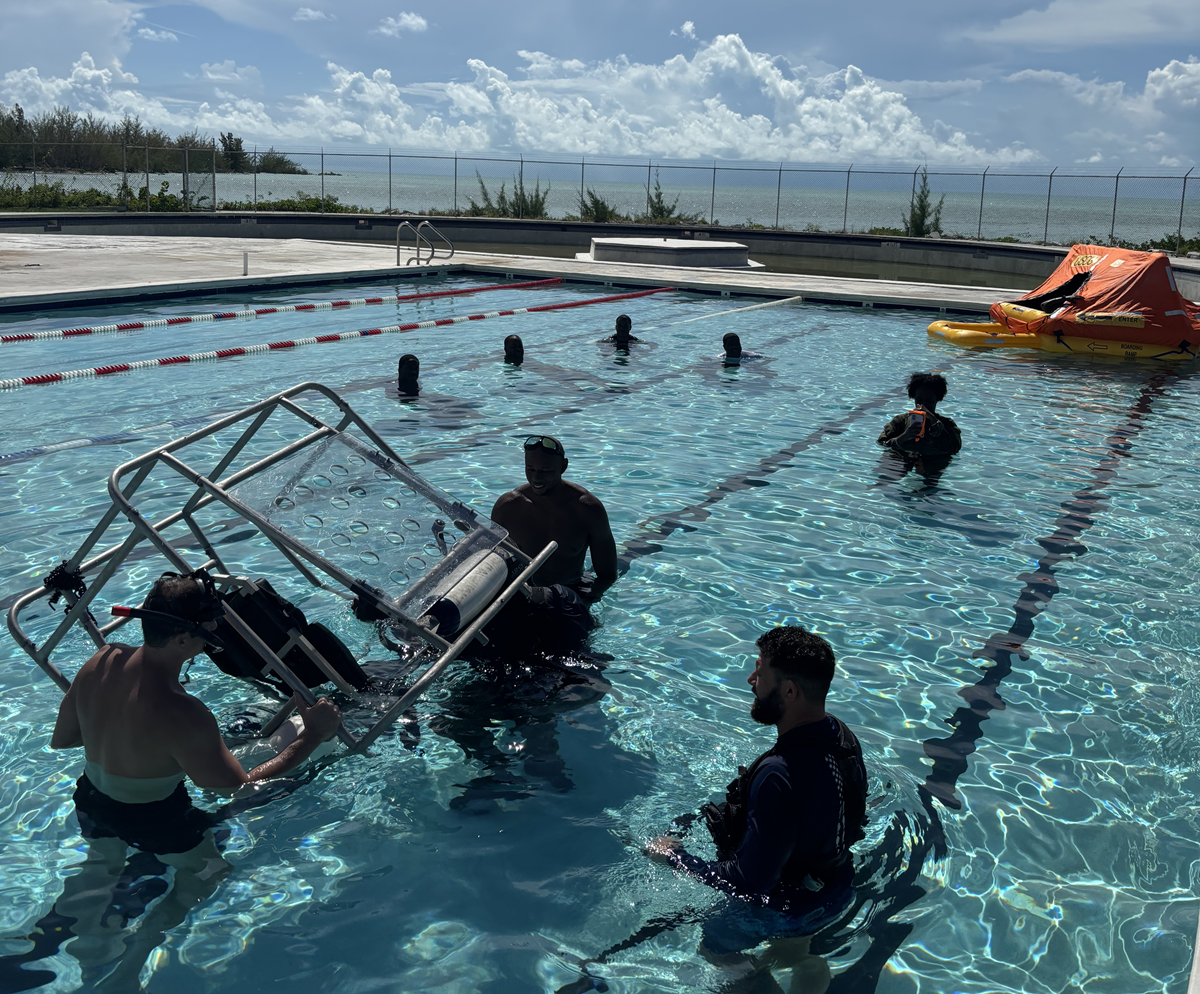
The Bahamas, September 10, 2025 – Rescue swimmers from the United States Coast Guard (USCG) Aviation Training Center in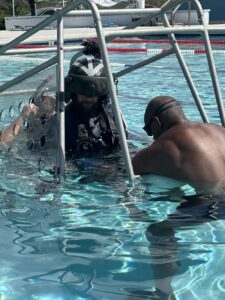 Mobile, Alabama visited Nassau to train Royal Bahamas Defense Force (RBDF) and Royal Bahamas Police Force (RBPF) members in water survival skills as part of Operation Bahamas Turks and Caicos (OPBAT) earlier this week.
Mobile, Alabama visited Nassau to train Royal Bahamas Defense Force (RBDF) and Royal Bahamas Police Force (RBPF) members in water survival skills as part of Operation Bahamas Turks and Caicos (OPBAT) earlier this week.
“Training alongside our USCG partners ensures our personnel are best prepared for the unique challenges of joint operations” said Superintendent Wendy Pearson, Commander Drug Enforcement Unit.
The multi-day exercise, centered on the USCG’s Shallow Water Egress Training (SWET), enhanced the safety and preparedness of Bahamian partners who routinely operate aboard USCG helicopters during OPBAT missions. The exercise provided hands-on instruction for 31 participants and strengthened interoperability between U.S. and Bahamian agencies engaged in counter-drug, search and rescue, and maritime security operations throughout the region.
“We were excited and proud to have the opportunity to share our expertise with our Bahamian partners. Not only did RBDF and RBPF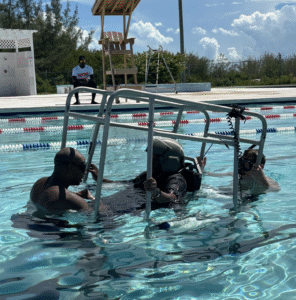 perform exceptionally well, they exceeded the standards we set for the event,” said Petty Officer Second Class Cole Johnson, USCG.
perform exceptionally well, they exceeded the standards we set for the event,” said Petty Officer Second Class Cole Johnson, USCG.
OPBAT is a cooperative multi-agency international operation supporting The Bahamas and Turks & Caicos Islands to stop illicit drug smuggling through the region. U.S. Embassy Nassau Chargé d’affaires Kimberly Furnish stated, “Since 1982, OPBAT has worked to stop the flow of illicit narcotics through the Caribbean, destined for the United States or other jurisdictions. This is international cooperation at its best.”






